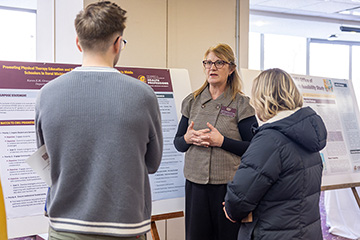Research shines a light on antibiotic resistance
COVID monitoring program could arm health providers with information
A Central Michigan University doctoral student hopes his research into wastewater collected during the COVID-19 pandemic will bring attention to the growing problem of antibiotic-resistant bacteria.
Chris Haupt, who is working on his doctorate in biochemistry, cell and molecular biology, studied wastewater samples collected from sites in Mount Pleasant to see if COVID-19 outbreaks were accompanied by increases in antibiotic-resistant genetic material.
The samples were collected in 2021-22 as part of CMU’s participation in a CDC-run program to detect early signals of COVID-19 outbreaks.
Once collected, the samples were frozen and stored. Last year, School of Engineering and Technology faculty Maggie Williams began examining them to see what they might tell us beyond COVID-19.
Haupt’s work is part of that. The underlying premise was that if people took antibiotics when they had COVID-19, there would be an increase in antibiotic-resistant bacteria.
Viral pandemic boosts bacteria’s strength
Antibiotics are prescribed to knock out bacterial infections like tuberculosis and pneumonia. Bacteria develop resistance to antibiotics. Infections from antibiotic-resistant bacteria are more difficult to treat.
The idea proved sound. Outbreaks of COVID-19 were accompanied by spikes in antibiotic-resistant genes, he said. It was a bit alarming but knowing also provided an opportunity.
“COVID really shined a light on how dire the situation is,” he said.
Doctors are prescribing more antibiotics than ever, but overall, they are now less effective than in the past. At the same time, pharmaceutical companies are also not developing new antibiotics to replace outdated ones.
It’s serious enough that some members of the scientific community refer to antibiotic resistance as “an invisible pandemic,” Haupt said.
Antibiotic resistance builds two ways
Bacteria develop resistance to antibiotics in a couple of ways. One is through mutation when resistant bacteria create offspring that inherit resistance through shared DNA.
But there’s another, more dramatic way. Bacteria can integrate genetic material floating loose in the environment, he said. Through this process – called horizontal gene transfer – bacteria never exposed to antibiotics could develop resistance.
Early in the pandemic, doctors prescribed antibiotics because scant testing resources made diagnosing COVID-19 difficult and because people hospitalized with it were at risk of developing companion bacterial infections, Haupt said.
The samples Haupt tested were collected more than a year after the pandemic started. While there are multiple ways antibiotics can get into wastewater, the spikes they saw coincided with COVID outbreaks, he said.
That probably meant that people were still taking antibiotics for COVID-19, Haupt said. He found genes carrying resistance to several different antibiotics, including commonly prescribed antibiotics like azithromycin.
How are antibiotics used in a viral pandemic?
Either doctors were still prescribing them, or people were just taking them, assuming there weren’t negative consequences, Haupt said. Those antibiotics, however they were administered, were flushed through users’ bodies and into Mount Pleasant’s sewers.
“At the end of the day, somebody took these antibiotics, and they ended up in the wastewater,” he said. It creates potential danger but could also provide critical intelligence in mankind’s endless arms race against microbes.
A localized outbreak of bacterial infections could involve microbes resistant to antibiotics, he said. That would make treating it more difficult right off since medical professionals might prescribe antibiotics that have minimal effect.




